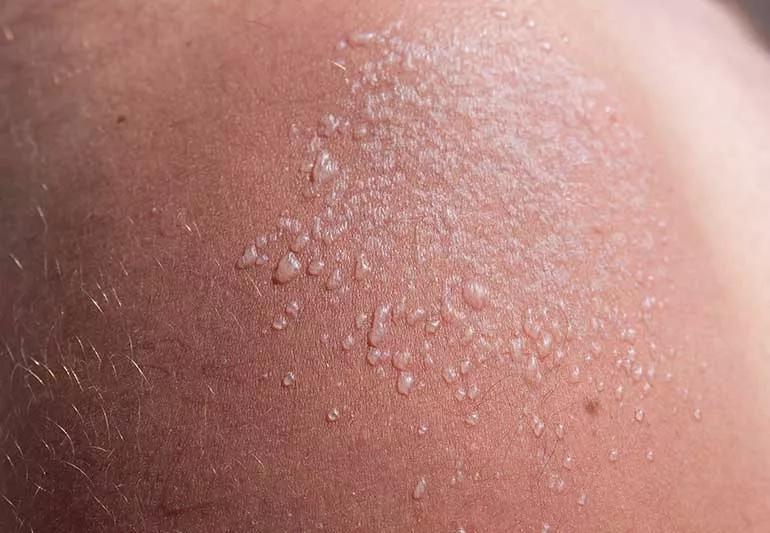Leaving a severe sunburn untreated can lead to dehydration and heat-related illness

Image content: This image is available to view online.
View image online (https://assets.clevelandclinic.org/transform/6414c31d-2c5c-4eaa-999b-cd3f318314cf/Sun-Burns-Blisters-1427504699-770x533-1_jpg)
zoom in on sun-blistered shoulder
You spent the day at the beach, frolicking in the waves, and all you have to show for it (besides sand everywhere) is a giant sunburn. Uh-oh. Do you need to worry?
Advertisement
Cleveland Clinic is a non-profit academic medical center. Advertising on our site helps support our mission. We do not endorse non-Cleveland Clinic products or services. Policy
“There are many health problems that can stem from sunburn,” says dermatologist Amy Kassouf, MD. “You don’t need to see your healthcare provider for every sunburn. But getting medical care when needed can prevent some of those serious conditions from developing.
“Sunburns are similar to thermal burns — the kind caused by touching hot surfaces, liquids, steam or flames,” she explains. “They don’t go as deep as thermal burns but are more damaging to your DNA.”
Dr. Kassouf shares the dangers of severe sunburn, how to know if you have one and when to seek medical care.
Video content: This video is available to watch online.
View video online (https://cdnapisec.kaltura.com/p/2207941/sp/220794100/playManifest/entryId/1_bohhsx9p/flavorId/1_5f3sgelj/format/url/protocol/https/a.mp4)
Sunburn is red, painful, damaged skin from being out in the sun for too long.
A small patch of first-degree sunburn (the least severe type) doesn’t typically cause serious health issues. But as your skin continues to react to ultraviolet (UV) radiation, you may develop concerning symptoms. See your provider if you have:
“Blistering skin means there’s more damage in the deeper layers of your skin,” Dr. Kassouf says. “You’re more likely to dehydrate, become feverish and develop inflammation. That’s when you need to seek medical care.”
Advertisement
You can develop health issues from a second-degree sunburn. These include:
Badly burned skin no longer holds moisture in your body, so you may dehydrate. Signs that you’re severely dehydrated include:
Sun poisoning is like an allergic reaction to a sunburn. Essentially, the extreme exposure to UV radiation causes skin inflammation. The main difference between sun poisoning and a typical sunburn is the additional symptoms you may develop with sun poisoning, including:
You don’t need to be in extreme heat to develop heat exhaustion, notes Dr. Kassouf. Severe sunburn causes a loss of body fluids that can lower your blood pressure and your blood volume. The first symptom is fatigue. In addition to feeling tired, you may also experience:
Heatstroke happens when your body can no longer control its temperature. The condition can cause permanent disability or even death if not treated quickly. It typically begins as heat exhaustion, but the symptoms rapidly worsen and may include:
“The danger of developing an infection typically greater a few days after the burn, when the blisters are breaking and there are exposed lower layers of skin,” Dr. Kassouf explains. Telltale signs of infection can include:
Don’t ignore the early signs of dangerous sunburn. See your provider if you have any signs of dehydration, sun poisoning, heat exhaustion or heatstroke. The symptoms of these health conditions go far beyond sunburn discomfort, can last much longer — and may even cause lasting damage.
“When your sunburn is serious, your skin is no longer a strong protective barrier for your body,” Dr. Kassouf reiterates. “You might develop symptoms of heat-induced trauma, such as dehydration, low blood pressure and shock. But it all starts with the sunburn.”
Advertisement

Sign up for our Health Essentials emails for expert guidance on nutrition, fitness, sleep, skin care and more.
Learn more about our editorial process.
Advertisement
Several conditions, like vitiligo and fungal infection, can cause a loss of pigmentation, leading to white spots or patches on your skin
This cooling gel can help soothe sunburned skin, but it can’t cure the burn
You know it’s not good if you’ve been holding onto it for more than three years or if it’s changed in color, consistency or smell
Look for a UPF rating of 50+ for optimal protection against UV rays
A sunburn will leave you itchy and red, while sun poisoning can feel like an allergic reaction
A cool shower, aloe vera gel, anti-itch treatments and cool compresses can provide fast sunburn relief
SPF stands for ‘sun protection factor’ — it’s a measure of how much protection you’re getting before a sunburn is possible
This ‘poisoning’ is actually a severe sunburn that seems similar to an allergic reaction
Although it could be used as a moisturizer, this new trend is not recommended
Communicating clear limits helps protect your time, energy and emotional well-being
High cholesterol can be genetic, but testing and treatment can lower your heart disease risk